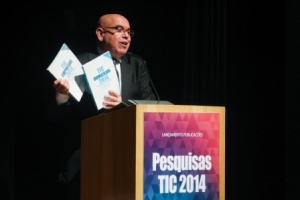Cetic.br celebrates ten years of ICT surveys with a debate on the importance of indicators
The event marked the launch of the 2014 ICT survey publications

Upon launching four survey publications on the access and use of information and communication technologies (ICT), the Brazilian Internet Steering Committee (CGI.br), through the Regional Center for Studies on the Development of the Information Society (Cetic.br), of the Brazilian Network Information Center (NIC.br), promoted, in conjunction with sector specialists, an analysis of the trajectory of ICT indicators production and its relevance for the formulation, implementation, and evaluation of public policies.
Released this Monday (23) during the debate "Ten years of ICT surveys: challenges and perspectives for digital inclusion in Brazil", the publications ICT Households 2014, ICT Companies 2014, ICT Education 2014, and ICT Kids Online Brazil 2014 are available at https://cetic.br/publicacoes/indice/pesquisas/. These consist of more than 1,600 bilingual pages that provide an analysis of the survey results, as well as a detailed description of the methodology adopted, in addition to featuring articles by experts from various sectors such as government, academia, civil society organizations, and international bodies.
In his welcome speech, Demi Getschko, CEO of NIC.br, highlighted the 10th year of survey production and emphasized the commitment of NIC.br and CGI.br to generate statistics about the Internet. "Those who have used and are using Cetic.br's surveys know that the data has great intrinsic value," he stated. In addition, Alexandre Barbosa, manager of Cetic.br, recalled that the studies are comparable internationally and play an important role in the formulation and evaluation of public policies in the country.
Sonia Jorge, executive director of the Alliance for Affordable Internet (A4AI), highlighted the contribution of ICT in an international context with her lecture "Unveiling realities, demystifying perceptions: measuring progress towards the sustainable development goals (SDGs)," and stated that there was a positive but insufficient advance. Data from A4AI reveals, for example, that none of the 51 emerging or developing countries reached the UN target of offering broadband at a cost of less than 5% of the monthly salary for two billion people living below the poverty line, that is, with less than two dollars a day.
"Technology is not neutral. The inequalities found offline are replicated online, where women, rural populations, and people living in poverty are marginalized groups," added Sonia. According to her, public policies should consider shared access and innovative measures for digital inclusion. She also emphasized the importance of the surveys produced by Cetic.br, which "do not only provide numbers but have context, give perspective, inform public policies, and tell stories," as well as the Center's work in Mozambique, where it contributed to the creation of ICT indicators that will be incorporated into the next Census of that country.
Debate
"We will not achieve any other inclusion without digital inclusion," noted Eduardo Diniz, professor at FGV-SP and moderator of the debate "Ten years of ICT surveys: challenges and perspectives for digital inclusion in Brazil." On the occasion, the consultant and former councilor of CGI.br, Rogério Santanna, one of the founders of Cetic.br, drew attention to the respectable production carried out by the Center over the past ten years. "Change cannot happen without creating intelligence. Therefore, it is essential to have indicators to define any public policy. And these data are important not only for the government but also for those doing business, conducting surveys, and acting in civil society organizations," he stated.
During the debate, CGI.br member and UFRGS professor Flávio Wagner discussed the value of science, technology, and innovation as an instrument to achieve sustainable development. "We need adequate indicators to monitor how innovation is actually happening and how to overcome the digital divide. Detailed study analyses allow the formulation of targeted public policies," he argued. According to the professor, the regional cut-offs available in the indicators produced by Cetic.br help to better understand different contexts that can be masked by global totals, deepening data analysis.
Regional differences were also addressed by CGI.br and PROTESTE counselor Flávia Lefèvre, who mentioned the universal right to Internet access, provided for in the Marco Civil law. "We observe that the provision of higher speeds is concentrated in the Southeast region and only on the coast of the Northeast. We need to use all the information provided by Cetic.br to reverse the discriminatory investment situation in the country," she declared. Flávia also addressed the need to give due weight to network neutrality as a guarantee of equality, especially in the process of regulating the Marco Civil, as well as preserving the multistakeholder governance of the Internet.
The business perspective, also addressed in the debate, was under the responsibility of Eduardo Parajo, CGI.br councilor and president of ABRANET. According to him, there is now a different perception of the Internet provisioning market thanks to the work carried out by Cetic.br with the ICT Providers survey. "If we combine the two thousand formal entrepreneurs who currently provide Internet provisioning services, we have the same size and scope as a large telecommunications operator," he exemplified by citing data from the survey.
All editions of Cetic.br's surveys are available at: https://cetic.br/. The evolution of indicators can also be checked through the data visualization tool: https://data.cetic.br/cetic/.
This content was automatically translated with the support of artificial intelligence.


